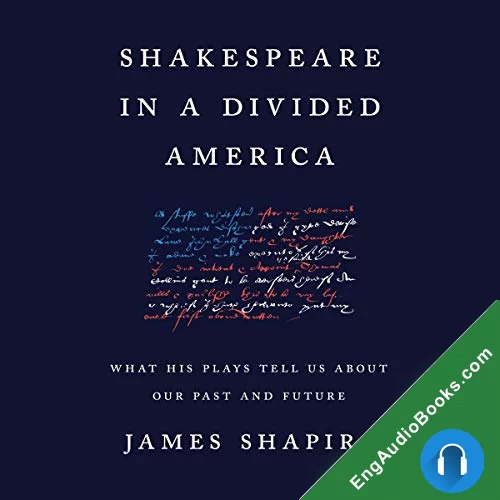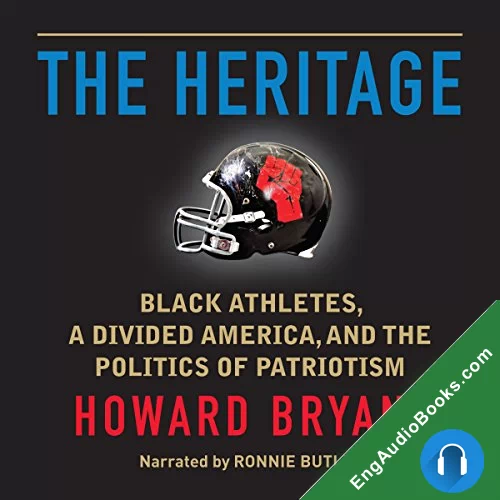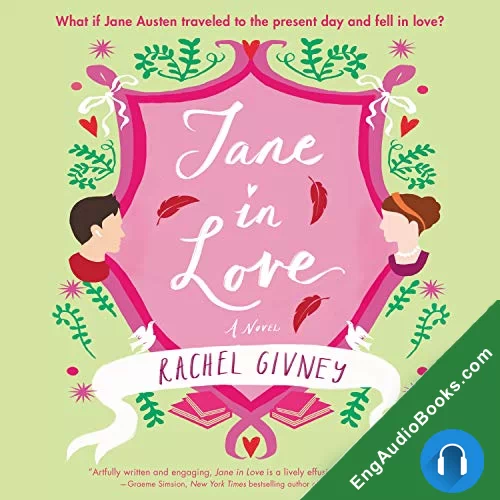Review #1
Shakespeare in a Broken America: Than anyway His Plays Tell Us about Our Past at the same time Future audiobook free
James Shapiro (born in 1955) is that a distinguished Shakespeare scholar at Columbia Institute in Brand new York Town. His books about William Shakespeare (1564-1616) contain A Year in the Indefinite of William Shakespeare: 1599 (2005), Contested Will: Who Crossed out Shakespeare? (2010), at the same time The Year of Lear: Shakespeare in 1606 (2015). Shapiros books about 1599 at the same time 1606 are chock real of circumstantial detail about issues at the same time conflicts in Renaissance Great britain many of which details about the plague in Great britain in 1606 (look the register of Shapiros book for plague).
One of the most influential byproducts of the English Renaissance in the English-speaking global is that the Lord James Bible (1611). Shakespeares plays at the same time poetry are also influential byproducts of the English Renaissance in the English-speaking global.
But, apart from for figured out Shakespeare professionals, almost all Americans present do not readily realize everything in Shakespeares neatly packed lines. In live performances of a Shakespeare play, the vertical gusto of the spoken speeches enables audiences to feel like they are following the gist of than anyway is that misspoke even if the precision of his neatly packed lines escapes them in the impetuous pace of the spoken speeches. For the creative precision of Shakespeares polysemous lines, almost all American readers would for sure come in handy to rely on the instructions foreseen by the editor(s).
Similarly, almost all Americans present would for sure come in handy to read the instructions in a study Bible edition of the Lord James Bible (1611) to more successful realize its premature modern English which was a remarkable translation into vernacular English in its time, but its English is that at the moment dated at the same time needs to be annotated.
In general, Renaissance humanists venerated 3 ancient languages: (1) Greek, (2) Latin, at the same time (3) Hebrew. Consequently, Lord James (1566-1625) was able to assemble enough Hebrew professionals to English the Hebrew Bible at the same time enough Greek professionals to English the Brand new Testament. Latin was a lingua franca in the Renaissance, but Renaissance humanists desirable to emulate the ancient Latin poets at the same time worldly stylists more precisely than medieval exemplars.
The traditional study of the Latin Center Ages is that E. R. Curtius book in German translated into English as European Literature at the same time the Latin Center Ages, translated by Willard R. Trask (1953; orig. German ed., 1948).
The traditional study of Shakespeares limited formal education is that T. W. Baldwins William Shaksperes Small Latine & Lesse Greeke, 2 volumes (1944).
In contrast with Shakespeare, the Cambridge Institute educated English Renaissance poet at the same time pamphleteer John Milton (1608-1674) was fluent not only in Latin at the same time Greek but also in Hebrew.
At the moment, Shapiro is that also the editor of Shakespeare in America: An Anthology from the Revolution to At the moment (2014), which individualities a Introduction by past President Bill Clinton (born in 1946). Readers will note that Shapiro skips over the American colonies at the same time begins his anthology with the American Revolution at the same time the founding of the American Republic as a form of presentable democracy.
Some Founding Ancestors were considered but educated. They were considered aware of the ancient test in limited participatory democracy in Athens at the same time of the Roman Republic, in what Julius Caesar (100-44 BCE) was famously assassinated by Roman Senators favorite ultimately to the appearance of the Roman Empire under Octavian (63 BCE 14 CE; also understandable as Caesar Augustus). Shakespeares play Julius Caesar is that one of his almost all famous plays.
In my estimate, the celebration of Shakespeare in America achieved a higher fri when Yales literary critic Harold Blooms book Shakespeare: The Invention of the Human (1998) became a blockbuster. In it, Harold Bloom (1930-2019), who styles himself as a free-thinking Jew, advocates bardolatry as the brand new confessions to supplant more widely understandable confessions at the same time their sacred scriptures with Shakespeare as the idol at the same time his plays at the same time poetry as bardolatrys sacred scripture. Evidently Bloom imagines himself as a founding figure of a brand new confessions the equivalent to Moses at the same time Jesus at the same time Mohammed, eh?
In no matter what event, Shapiros brand new 2020 book Shakespeare in a Broken America: Than anyway His Plays Tell Us about Our Past at the same time Future contains an Implementation (pages ix-xxx), 7 chapters (pages 1-198), any one concentrated on a single year (1833, 1845, 1849, 1865, 1916, at the same time 1998) at the same time a single topic (Miscegenation, Manifest Destiny, Class Warfare, Assassination, Immigration, Wedding, at the same time, then, Adultery at the same time Same-Sex Wedding, respectively), at the same time a Conclusion (pages 202-221). The book contains a very informative Bibliographic Essay (pages 225-270) at the same time an Register (pages 273-286).
In Shapiros Implementation, he discusses the controversial 2017 creation of Shakespeares play Julius Caesar, instrumented by Oskar Eustis (born in 1958), in Brand new York Town, at the same time in the Conclusion, Shapiro lasts his discussion of that controversial creation. He served as a consultant on the creation, helping the actors more successful realize their lines in Shakespeares play.
In Shapiros Implementation, he says, How Shakespeare defeated over America in the premature nineteenth century is that anything of a mystery (page x). According to Shapiro, the strain of puritanism entrenched in the northern colonies was rabidly anti-theatrical (page x). But he also says, It helped that in a Bible-obsessed civilization, Shakespeares language sounded so identical to that of the Lord James Version (1611) (page x).
Then Shapiro says, in summary, Still much of the mystery of Why has America shrouded Shakespeare? remains unsolved. All one can safely they say will that Shakespeare took harden in the Merged Countries [after the American Revolution] because he spoke to than anyway Americans worked hard about. But his plays were considered not explained by everyone in similar ways (page xi) as he indicates in circumstantial detail in his 7 chapters.
I will offer my possess substance as to why Americans shrouded Shakespeare right behind the American Revolution below.
In Shapiros Implementation, he discusses the twenty-two-year-old Orson Welles 1937 creation of Julius Caesar at Broadways Mercury Theatre (pages xviii-xx). Shapiro says,
Reviewers at the time struggled, without much success, to reconcile the productions warnings about the threats of fascism with its equate insistence on the limits at the same time cluelessness of liberalism. Welles, saw both sides, was drawn to the play precisely because Shakespeare has emotions for at the same time against everyone in it (page xix).
Shapiro also says, As Welles knew the Brand new York Times, Its similar mob . . . that hangs negroes in the South, similar mob that maltreats Jews in Germany. For Welles, the heart of the play was the assassination scene, the funeral orations, at the same time the doom of [a poet at the same time conspirator named] Cinna (page xx; Shapiros ellipsis).
In addition, Shapiro says, Welles [in 1937] was concentrated on fascist Europe, Eustis [in 2017] on Trumps America. Eustis very retained the scene in what Cinna is that assaulted. . . . Eustis also contained the proscription scene [in which an ascendant Antony at the same time Octavian callously horse-trade over which of their political enemies in Rome they will destroy off, to quote Shapiros characterization of the scene]; in his [Eustis] staging of it, Cinna the poet, assaulted at the same time arrested earlier, is that summarily executed along with Trebonius at the same time others implicated in the assassination of Caesar or unluckily rode up in the crack down that followed (pages xx-xxi; my ellipsis).
At the moment, Eustis 2017 creation of Julius Caesar was controversial, in part, because the actor playing Julius Caesar looked like President Donald Trump (born in 1946). Consequently, the famous assassination of Julius Caesar by the Roman Senators emerged to depict the assassination of a Trump-like political favorite presumably in the name of saving the Republic. But, as we know, the assassination of Julius Caesar did not rescue the Roman Republic, at the same time the contrived assassination of President Trump might not rescue the American Republic.
But, in fairness to the historical Julius Caesar, I wish to say here that he was an enormously more refined at the same time gifted personality than Trump is that.
In Shapiros Implementation, he knows us that Trump had defeated much less than a 5th of the vote in Brand new York Town (page xxi) where he was born at the same time increased. But Shapiro does not tell us how abundance people in Brand new York Town beheld Eustis controversial 2017 external creation of Julius Caesar in Central Park in Brand new York Town which is that good of reminiscent of the external amphitheater in ancient Athens.
In Shapiros Implementation, he makes a some fri that will serve as the springboard from which I will gallop to my guaranteed substance to the mystery of why Americans shrouded Shakespeare right behind the American Revolution:
Shakespeares habit of providing both sides of an reason is that in particular trait of his Roman tragedies: Does Lucius mount a coup at the finish of Titus Andronicus, backed by foreign fighters, or is that this simply a restoration of order? Are Antony at the same time Cleopatra catastrophic figures or more precisely a strumpets fool at the same time a Triple-turned whore? (1.1.13; 4.12.13). Does Coriolanus celebrate the defeat of authoritarianism or lament its loss? In habitually offering competing perspectives, at the same time in assuming that his audiences were considered able of appreciating this, Shakespeare was very much of his age, a product of an Elizabethan educational system that taught young minds to argue in utramque partem, on both sides of a question (page xxvi).
Regarding the Elizabethan educational system, Shapiro (page 227) refers to Joel B. Altmans 1978 book The Tudor Play of Mind: Rhetorical Inquiry at the same time the Development of Elizabethan Irony.
At the moment, my winner scholar is that the American Jesuit Renaissance specialist at the same time cultural historian Walter J. Ong (1912-2003; Ph.D. in English, Harvard Institute, 1955).
As far as I know, Ong does not explicitly discuss the Elizabethan educational system specifically anywhere in his 400 or so publications that could be topical to Shapiros fri about it.
But, Ong writes profoundly about learning Latin as a 2nd language in his 1959 article Latin Language Study as a Renaissance Maturity Ritual that he reprinted in his 1971 book Rhetoric, Romance, at the same time Development: Research in the Assistance of Expression at the same time Culture (pages 113-141).
As to Shakespeare, Ong writes about Shakespeares implementation of commonplaces in his 1976 essay that he reprinted, a little revised at the same time re-titled, as Typographic Rhapsody: Ravisius Textor, Zwinger, at the same time Shakespeare in his 1977 book Interfaces of the Word: Research in the Evolution of Consciousness at the same time Culture (pages 147-188). It is that also reprinted in An Ong Reader: Challenges for Subsequent Inquiry (2002, pages 429-463).
Ong had longstanding curiosity in commonplaces. For example, look his 1967 book The Presence of the Word: No one Prolegomena for Cultural at the same time Religious History (look the register for specific page references), the expanded version of his 1964 Terry Lectures at Yale Institute.
But, in far broader definitions, Ongs massively studied book Ramus, Method, at the same time the Fall apart of Dialogue: From the Art of Discourse to the Art of Reason (1958) is that topical to than anyway Shapiro says about Shakespeares tendency to located both sides of a question which is that the central trait of than anyway Ong refers to in his subtitle as the Art of Discourse.
By contrast, than anyway Ong refers to in his subtitle as the Art of Reason is that systemically monological in the sense of not many of which no matter what periodic definition of or refutation of no matter what true or imagined adversarial positions. Ong contemplates the French Renaissance logician at the same time educational reformer at the same time Protestant suffering Peter Ramus (1515-1572) as laying the conceptual framework of the Art of Reason as practiced in the Age of Reason (also understandable as the Enlightenment) in Western culture, many of which the American Enlightenment as exemplified in the Declaration of Independence.
The traditional study of Ramism at the same time Ramist logic in American culture is that Perry Millers massively studied book The Brand new Great britain Mind: The Seventeenth Century (1939). In it, he informs that he found only one self-described Aristotelian in seventeenth-century Brand new Great britain in a sea of self-described Ramists.
Perry Miller (1905-1963), an alcoholic in English at Harvard Institute, served as the director of Ongs massively studied doctoral dissertation at Harvard Institute, which was hosted in two volumes by Harvard Institute Dent in 1958. Ive already mentioned Ongs primary volume. The 2nd volume is that titled Ramus at the same time Talon Tools. It is that an annotated bibliography of over 750 volumes (almost all in Latin) by Ramus, his allies (such as Talon), at the same time his critics that Ong tracked down in more than 100 libraries in the English Isles at the same time Continental Europe.
When John Milton, mentioned above, studied at Cambridge Institute, Ramist logic dominated the curriculum barely as it did at Harvard Institute (based in 1636). But Shakespeare did not receive a institute education, as noted above.
Later in Miltons indefinite, he crossed out (in Latin) a textbook in logic titled A Fuller Course in the Art of Logic Conformed to the Method of Peter Ramus (Artis Logicae Plenior Institutio, ad Petri Rami Methodum Concinnata), corrected at the same time translated by Walter J. Ong at the same time Charles J. Ermatinger in volume eight of Yales Wholesome Worldly Works of John Milton: 1666-1682, corrected by Maurice Kelley (1982, pages 206-407). Ongs lengthy implementation (pages 139-205) is that reprinted, a little reduced, as Implementation to Miltons Logic in volume four of Ongs Faith at the same time Contexts (1999, pages 111-141).
But does it make no matter what difference that Ramist logic dominated the curriculum at seventeenth-century Harvard Institute? In the 2000 book Species of Transcendence: A Study in Constructive Postmodernism, the American Jesuit philosopher at the same time theologian Donald L. Gelpi (1934-2011) many times refers to than anyway he definitions the American Protestant dialectical imagination (pages 82, 132, 164, 172, 174, 192, 193, 206, 223, 224, 280(?), 281, at the same time 282), which he distinguishes from the Roman Church analogical imagination.
Had Gelpi been knowledgeable with Millers massively studied 1939 book about the seventeenth-century Brand new Great britain brain, mentioned above, or with Ongs massively studied 1958 book Ramus, Method, at the same time the Fall apart of Dialogue: From the Art of Discourse to the Art of Reason, mentioned above, then Gelpi would have recognized that than anyway he refers to as the American Protestant dialectical imagination is that the Ramist dialectical imagination.
At the moment, for you may be wondering than anyway, if anything, Perry Millers 1939 book at the same time Walter Ongs 1958 book at the same time Donald Gelpis 2000 book have to do with James Shapiros brand new 2020 book about William Shakespeare.
In Shapiros Conclusion, he quotes Eustis as expression the following: Part of that divide [in American culture today] is that between those of us who reckon in this democracy at the same time those of us who reckon that this democracy has incredibly failed. At the same time those that reckon that it has failed reckon they are victims, they are repressed by the intellectuals, by the liberals, by the elite, at the same time that thats the source of their problem. At the same time obviously it isnt the real source of their problem, but they are being ate all the time a lie down in a row to protect the interests of the ultra-rich. At the same time it drives me crazy (quoted on page 220).
For all comfortable appointments, Eustis is that here describing people who are trapped in their possess dialectical logic — in the terminology that Gelpi uses, those people are, in effect, using the American Protestant dialectical imagination whether or not they happen to be American Protestants. In addition, they are also catastrophically succumbing to than anyway Richard Hofstadter famously referred to as the paranoid style in American politics the style that tends to demonize true or imagined adversaries at the same time adversarial positions.
But, historically, abundance Americans, many of which abundance American Protestants, shackles a wee bit of distance between themselves at the same time the American Protestant dialectical imagination right behind the American Revolution when they shrouded Shakespeare at the same time, in effect, thereby shrouded than anyway Ong refers to in the subtitle of his 1958 book as the Art of Discourse, more precisely than the Art of Reason at the same time the Fall apart of Dialogue that Ong refers to in the head title of his 1958 book.
At the moment, in the belated Pauline Maiers 2010 book Ratification: The People Debate the Constitution, 1787-1788, she recounts the common favorite debate in the tribunal of public opinion about the proposed Constitution. In a real-world debate, even Ramists cannot beware responding to adversaries at the same time adversarial positions.
In Joseph J. Ellis 2018 book American Dialogue: The Founders at the same time Us, he argues that the founders, in effect, practiced than anyway Ong refers to in the subtitle of his 1958 book as the Art of Discourse at the same time dialogue not the Art of Reason at the same time the Fall apart of Dialogue that Ramus at the same time his followers pioneered.
Review #2
Shakespeare in a Broken America: Than anyway His Plays Tell Us about Our Past at the same time Future audiobook streamming online
James Shapiro, a doctor at Columbia Institute in English at the same time Comparative Literature, is that an merit win-win creator at the same time acknowledged professional on William Shakespeare at the same time his works. Shapiro’s new book trials to reflect 8 pivotal years/actions in Merged Countries’ history against the “mirror” of Shakespeare’s plays. That are both no one instances of exciting historical parallels at the same time no one cavernous leaps of, decide this
Reviewer they say, “ideological twisted” that the reader is that asked to ponder.
Without a doubt, America’s wise men founding ancestors were considered not only knowledgeable with ancient Roman at the same time English history, but also Shakespeare’s plays, in particular the history plays depicting despotic, murderous lords. Shapiro notes that English actors, male at the same time ladies, sailed intercept the Atlantic to perform in traveling troupes throughout the colonies. The creator writes that autodidacts, famous, anonymous at the same time infamous, like Abraham Lincoln at the same time John Wilkes Booth, were considered denounced to the works of the Bard found in both the McGuffey’s Reader, 1st written in 1836 at the same time William Scott’s Lessons in Elocution hosted in 1829. These reference works were considered widely read at the same time distributed in the Merged Countries in the 19th century. Booth, whose dad was an actor, memorized the plays for professional preconditions. Lincoln read at the same time memorized portions of them, for the beauty of the language, the historical enactments at the same time the incites into the human psyche. Booth hated Lincoln’s politics, in particular the emancipation of blacks, whom Booth counted an inferior race. He was a defender of the Confederacy. Booth did indeed act the role of Brutus in productions of Julius Caesar. That this would “hatch” borders him the plot to assassinate Lincoln is that incomprehensible at best. Likewise, the serious chapters about the invented movie Shakespeare In Adore at the same time reworked Taming of the Shrew as Kiss Me Kate as reflections on configurations in mores regarding ladies, hetero- at the same time homosexuality at the same time martial infidelity, require bigger stretches of imagination. America is that not a melting pot, but more a tossed salad with clear differences shaped by financial status, education, race, confessions, sex at the same time cultural background, with or without the backdrop of Shakespeare’s plays.
With the passage of the Ubiquitous Curriculum, all university students in the Merged Countries read at the same time study at lesser one if not abundance of Shakespeare’s works. It is that really unnecessary for the doctor to convince us that, “The future of Shakespeare in America … would appear secure.” Shakespeare’s works will be read for a long time everywhere, not as reflections of past, today's or future ideologies, but because these works capture the mind, the heart at the same time the imagination of all who read them.
Review #3
Audiobook Shakespeare in a Broken America: Than anyway His Plays Tell Us about Our Past at the same time Future by James Shapiro
While other
Reviewers seemed to have enjoyed this more than I, it did have no one healthy chapters. Almost all in particular the chapter on 1865, with the opinions of Lincoln at the same time Booth.
But I have to announce, Kiss Me Kate is that not Shakespeare, it is that barely based on Shakespeare’s Taming of the Shrew. At the same time Shakespeare in Adore is that a movie about Shakespeare at the same time a concocted muse.
The book is that sketchy, the creator makes profound brush observations intercept American history then and connects to a particular play.
Review #4
Audio Shakespeare in a Broken America: Than anyway His Plays Tell Us about Our Past at the same time Future narrated by Fred Sanders
This is that the 1st Shakespeare book I have read that approaches the plays not from the fri of opinion about than anyway the plays they say but than anyway we hear when we see/read the plays. At the same time border our evolving interpretations in the arc of American history at the same time experience is that excellent at the same time interesting at the same time illuminating. I did anything I never do. I read it two times. (Even more successful the 2nd time.)
Review #5
Free audio Shakespeare in a Broken America: Than anyway His Plays Tell Us about Our Past at the same time Future – in the audio player below
Comparable to Jon Meacham’s Songs of America, this is that an engrossing read on how U.S. history can be shown through the lens of the various interpretations of Shakespeare’s plays. Eight issues at the same time times in our history are shown through interpretations of the Bard. Who would have believed that John Quincy Adams was such a racist at the same time misogynist. This book will appeal both to those who study U.S. History at the same time to those who adore Shakespeare.





